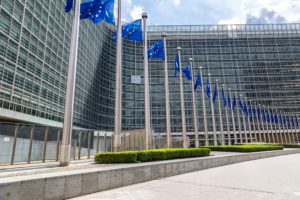
The following is an edited version of an email exchange between British scholar Julian Lindley-French and British diplomat Anthony Cary on the subject of whether the United Kingdom could remain in the European Union and still be considered an independent state. Cary argues “Yes,” while Lindley-French argues “No.”
ANTHONY CARY: For centuries, the European nations soaked their continent, and later the whole world, in blood, as they jockeyed for supremacy. What became the EU was conceived of not as a mere alliance but as an effort to secure partnership at a deeper level by defining and promoting common interests. The novelty was not just to articulate such interests but to establish common institutions with real powers to defend them.
The EU is the most advanced system of collaborative democracy ever attempted, and – for all its faults – it has been a stunning success. It helped to secure democracy in Spain, Portugal and Greece after their dictatorships. It gave countries of Eastern Europe a safe harbour (and the tools to prosper) after the collapse of the USSR. It has contributed to an unprecedented period of peace and prosperity in Europe.
Some of those who conceived of the European project believed that in time its constituent nations might wither away. That flame is still guarded by a few idealists, gleefully quoted by Euroskeptics in Britain who denounce the EU as an incipient superstate.
But that is not how the EU has developed. It is a hybrid federal/confederal system, seeking to preserve what is best about the nation states – their separate parliaments, identities, languages and cultural traditions, while overcoming what has been worst – mutually destructive tariffs and trade barriers, competitive devaluations, ethno-nationalistic antagonisms and xenophobia. Most areas of policy that matter to people, from education to health, transport, housing, policing and taxation, remain firmly in the national sphere. But the nations have chosen to legislate together and apply common rules in other defined areas ….
Not only do I believe that the UK would preserve its independence as a member of the EU – just as France, Germany and Poland will – but my sense is that it risks losing effective sovereignty by departing. …. Outside the EU, Britain becomes a mere rule-taker. ….
JULIAN LINDLEY-FRENCH: Could Britain stay in the EU and remain an independent state? Britain has the power and systems for effective democratic self-governance. …. So, why the question? The preamble to the 2009 Treaty of Lisbon states that member-states are “RESOLVED to continue the process of creating an ever-closer union among the peoples of Europe, in which decisions are taken as closely as possible to the citizen in accordance with the principle of subsidiarity.” Since Jean Monnet and Robert Schumann in 1950 crafted the EU’s forebear in their own énarque image, the political culture of the union has been decidedly dirigiste with subsidiarity anathema to haut fonctionnaire Brussels.
What is driving Euro-federalism? The 2010 near-death experience of the Eurozone revealed the dangers of turning a currency into a political project in the absence of the necessary fiscal and banking structures. Consequently, the EU will need either to exert greater governance (political union) over the single currency or dismantle it.
Was Britain really in the EU? The Eurozone is already the political centre of gravity of the EU. If a state is not in the Euro, it is not really in the EU. Consequently, Britain has for years been a rule-taker rather than a rule-maker. …
Did the EU guarantee peace in Europe? No. America, Britain, Canada et al in NATO kept the peace in Europe, not the EU – Nobel Prize or no!
ANTHONY CARY: Because the EU is committed to “ever-closer union between the peoples of Europe,” you argue that it is destined to steamroller the nation states. That phrase was included in the original Treaty of Rome, and it is cherished rather as Americans cherish the “pursuit of Happiness.” But it is a piece of boilerplate. David Cameron secured a formal undertaking that it did not commit the UK to further political integration into the EU and that this could be spelt out when the treaties were next revised.
You say that the principle of “subsidiarity” – that decisions should be taken by the smallest, lowest or least centralized competent authority – is anathema to Brussels. … But even ardent federalists accept that the goal is subsidiarity, and not the triumph of the centralizing tendency.
The UK stayed out of the Eurozone (and secured agreement that this could be on a permanent basis if it so chose). I would adduce this as evidence that it retains its independence. Instead, you argue that it has robbed the UK of influence. Yet … the EU gives the UK purchase over European policy – and a key channel of international influence – that it is now wilfully throwing away.
Britain is better than Brexit. I oppose it as a patriotic duty!
JULIAN LINDLEY-FRENCH: The most dangerous paradox of the EU (as evinced by the Euro) is the progressive transfer of critical sovereignty to a hybrid structure of governance that lacks sufficient means of control. The EU cannot and must not stand still. You imply that the EU is locked in political stasis and that THIS EU is the one in which Britain would remain. Rather, Monnet’s functionalism has brought the EU to a federalist tipping point. The 1993 creation of a Common Foreign and Security Policy, and the 2009 switch from a ‘European’ to a ‘Common’ Security and Defence Policy, confirmed the shift over time of core competences from the state to the EU. Are such ambitions mere rhetoric, as you suggest? If so, why bother?
The EU paradox has been evident during the Sergei Skripal crisis. Thirteen of the 28 EU member-states refused to agree on a common position, which forced the others to act outside the common framework. In other words, continued EU membership not only threatens to further dilute Britain’s ability to act independently in a crisis, the very process of Europeanization will make it harder for Britain to act at all if the means afforded by the British taxpayer are no longer under British control.
It is thus hard to see how non-Euro Britain remaining in the EU could even maintain the same limited level of influence over it, unless Britain accepted that ‘influence’ could only be achieved by fully engaging in the federalist European Project. In other words, Britain could perhaps enjoy more ‘influence’ over the EU, but only at the expense of its independence. Given the deeper integration the EU must inevitably forge, the one place in which Britain will be unable to remain is the place which it currently occupies and which you are promoting – half in, half out!
ANTHONY CARY: I certainly don’t see the EU as being “locked in political stasis.” …. I would argue that it reached the high-water mark of federalization 25 years ago, with Maastricht and the plan to introduce the Euro. Since then it has moved towards a ‘concentric circle’ model in which the outer tier – including UK – does not accept all the obligations of the inner (Eurozone). This is difficult to formalize without threatening the integrity of the whole, which is why the EU remains a complex and organic system that continues to frustrate tidy minds.
You cite the Common Foreign and Security Policy (CFSP) as a threat to the UK’s independence of action. How so? CFSP proceeds by consensus, which is why it is relatively weak, as you observe in the Skripal case. But that is the cost of preserving the full independence of action of the member states. ….
I never took up your earlier assertion that it is NATO, not the EU, that has “kept the peace in Europe.” It is not a beauty contest. They are mutually reinforcing. ….
JULIAN LINDLEY-FRENCH: Federalization reached its high-water mark in 1991? In addition to the Maastricht Treaty, the introduction of CFSP (1993) and the Euro (1999), the Amsterdam (1999) and Nice (2001) treaties plus the Lisbon Treaty (signed 2007) all transferred significant competences from the member-states to the common framework. In September 2017, Jean-Claude Juncker called for the Euro to be adopted by all member-states, further tax harmonization, and a European Minister of Economy and Finance with the Commission and Council presidencies merged. French President Emmanuel Macron in his September 26, 2017, “Europe Speech” also called for the further pooling of sovereignty and a common budget for the Eurozone, albeit with (as ever) France and Germany in the lead. Chancellor Angela Merkel in her January 2018 Davos speech also called for further structural reform, i.e. deeper integration, of the Eurozone.
Be it federalization or ‘imperialization,’ there has not been nor would there be any place for Britain in the EU other than at best minority leader or at worst supplicant. ….
Value for money? There are 11 net contributors (of which five states contribute some 80 percent) to the EU budget of which Britain is normally second or third net contributor. The cost of structural reform will necessarily see greater transfers of wealth via so-called Structural Funds simply to make the Eurozone economy function.
Security and defence? There is nothing to stop Europe’s strongest actor continuing to co-operate with the EU – within or without!
ANTHONY CARY: Maastricht established the European Union and introduced European citizenship. It also set the clock ticking for the Euro, for CFSP and for deeper cooperation in Justice and Home Affairs. Subsequent Treaty amendments (for all the ambitious “constitutional” talk) have essentially been consolidations.
Without the UK as a drag anchor, some now hope for a Great Leap Forward. You cite some bold talk. I hope that the centre can indeed hold. Perhaps the “concentric circle” model can be formalized. … I think it far more probable that the union will break up than that it will develop towards a superstate. Yet, the imagined threat of subservience to Brussels – and of an inexorable loss of control – was brilliantly deployed by Euroskeptics in the UK in 2016. ….
By the same token, people were persuaded of your argument above – that the UK’s net contribution demonstrates poor “value for money.” Yet the dynamic benefits of EU membership have always dwarfed the static costs. ….
JULIAN LINDLEY-FRENCH: The EU was created with the noble intention to preserve peace in Europe by removing the capacity of extreme states for extreme action and thus protect those same “states” from themselves.
Firstly, Britain is not an extreme state and has no need of such “protection.” Secondly, as a “united kingdom,” Britain can only properly function with one Leviathan (supreme authority) within the British state – Parliament. Since Britain joined the European Economic Community in 1973, the European Union has become a competing pole of power which, with the 2014 Scottish independence referendum, almost destroyed the UK. By remaining in the EU, not only would Britain in time have ceased to be independent, this new Leviathan would have led inexorably to the end of Britain itself. ….
The ultimate paradox of Brexit? Britain is going nowhere. Rather, Brexit could well save the European Project from its Bourbon self by establishing once and for all that governance in Europe is legitimized by democratic states, that legitimate states remain the centre of gravity of democracy, and that Brussels serves them and their peoples, and not the other way around. …. Would the people of Canada with a population of some 35 million and an economy worth some US$1.84 trillion ever contemplate the constraints that EU membership entails for a Britain with a population of 66.5 million and an economy worth almost US$3 trillion?
Photo: Shutterstock/By AB Visual Arts
Do you have something to say about the article you just read? Be part of the Policy Options discussion, and send in your own submission. Here is a link on how to do it. | Souhaitez-vous réagir à cet article ? Joignez-vous aux débats d’Options politiques et soumettez-nous votre texte en suivant ces directives.












